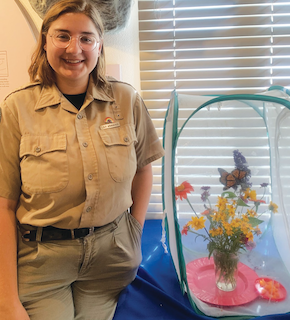There was good and bad news for the 1,200 customers of the struggling Big Basin Water Company who have had their drinking water trucked in at a cost of $60,000 a month.
In the last two weeks, BBWC has stopped trucking in water, has cut the cost of importing water by 60% and is now able to stock reserve tanks.
However, “Well 4”, the primary source of drinking water for customers, was operating at about 100 gallons per minute, a third of its capacity.
That was the update given at a Nov. 2 town hall, where 50 people packed the Boulder Creek Fire Protection District headquarters and an additional 40 via teleconference.
“We have water ready and available and in reserve in our tanks,” attorney Nicholas Jaber said. “Likewise, for the first time in many, many months water levels are in fact, steadily rising in our primary tanks.”
The public meeting, which was hosted by the office of District 5 Supervisor Bruce McPherson, also served to introduce Jaber, an attorney with Silver & Wright LLP, who has taken on the task of steering the receivership. Silver & Wright signed on as the public receiver for BBWC on Oct. 5.
In the month since Santa Cruz Superior Court ruled to assign a public receiver for Big Basin Water Company’s (BBWC) drinking water operation to take over the company’s finances and bring it back into compliance with state water regulations, the efforts to steady the situation of the troubled private utility have begun to take shape. BBWC customers have been waiting years for a solution to the problems with drinking water and wastewater services.
Steady Flow
Since the receiver took over, problems with the flow of water from wells that feed the drinking water system for BBWC forced the operation to truck in water to serve customers. Jaber said that, on average, trucks would haul in around 4,000 gallons a day. In the last month, Jaber said it was a “huge problem” and “ financially unsustainable for the receivership.”
A positive development came with working with the San Lorenzo Valley Water District. Now, flow between the San Lorenzo Valley system and BBWC’s has increased from 15 gallons per minute to 62 gallons per minute.
The receivership has so far managed to stabilize the water flow, but in late October any progress made seemed in jeopardy.
When Silver & Wright took over as receiver on Oct. 5, BBWC’s operations were being managed by Central States Water Resources (CSWR), a private utility company which had entered into a tentative agreement to buy BBWC. At 6:30 a.m on October 20, CSWR sent out a notification to customers of BBWC it was terminating its contract as operator effective immediately.
Jaber informed town hall attendees that with the help of Santa Cruz County and Supervisor McPherson’s office they were able to secure $40,000 to “keep the lights on” at BBWC. The money was used for the “day-to-day operations” and “primarily-purposed to support water hauling.” Jaber also revealed that the county recently obtained a $240,000 grant from the California Department of Water Resources to fund the purchase of “emergency” water.
“Without these funding packages I’m not really sure where we’d be right now, but it would be pretty dire,” Jaber said.
Jaber acknowledged that customers would see an increase in their water bill as BBWC anchors itself and builds a comprehensive billing system. He said that, at the moment, they are purchasing water from San Lorenzo Valley Water District for roughly 13 cents per unit and are selling it to customers at about 3.5 cents per unit. How much the increase will be for customers is yet to be determined.
Jennifer Epp, a representative of the Central Coast Regional Water Quality Control Board, which regulates BBWC’S wastewater operations, said that her office was blindsided by the abrupt departure of CSWR. CSWR also operated the wastewater facility, and now officials are working on short-term solutions to keep the plant running. Roughly 30 customers are serviced by the plant.
The water board filed a complaint on Oct. 24 in Santa Cruz Superior Court against BBWC owners Thomas J. and Shirley Moore and CSWR, according to Epp. The court issued an order the next day requiring CSWR to run the plant until Nov. 9.
“We took them to court for basically walking away from you guys and we prevailed,” Epp said.
The wastewater plant is still running and decisions are being made on a day-to-day basis. The next court date is Nov. 9 and further steps will be determined after.


























